Blog
Treatment Options for Morton’s Neuroma
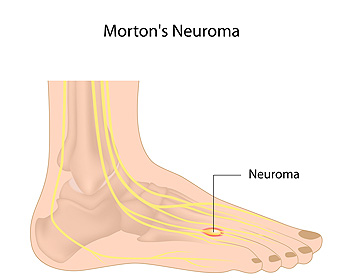
Morton's neuroma is a painful condition that affects the nerves above the third and fourth metatarsals of the foot and leads to discomfort and mobility issues. Treatment approaches of Morton's neuroma vary depending on the severity of the symptoms. Non-surgical treatment includes wearing custom insoles prescribed by a podiatrist to specifically address the pain generated in the ball of the foot. These insoles can offer tailored support, alter foot mechanics, and absorb shock. They also provide targeted relief and improved gait, making them a valuable option for those seeking comfort and mobility. Further, orthotic devices can support the arch of the foot and correct other biomechanical issues. In more severe cases, advanced treatment options are available. Steroid injections may offer relief for up to five years in some cases, although results can vary. Surgical interventions, such as nerve removal surgery, are considered when other treatments are ineffective or when a noticeable growth is present. Timely management can help to prevent Morton's neuroma from getting worse, eventually becoming a chronic issue. If you are experiencing symptoms, it is suggested that you make an appointment with a podiatrist to determine what the best treatment plan is for you.
Morton’s neuroma is a very uncomfortable condition to live with. If you think you have Morton’s neuroma, contact Dr. Douglas Mckay of New Jersey . Our doctor will attend to all of your foot care needs and answer any of your related questions.
Morton’s Neuroma
Morton's neuroma is a painful foot condition that commonly affects the areas between the second and third or third and fourth toe, although other areas of the foot are also susceptible. Morton’s neuroma is caused by an inflamed nerve in the foot that is being squeezed and aggravated by surrounding bones.
What Increases the Chances of Having Morton’s Neuroma?
- Ill-fitting high heels or shoes that add pressure to the toe or foot
- Jogging, running or any sport that involves constant impact to the foot
- Flat feet, bunions, and any other foot deformities
Morton’s neuroma is a very treatable condition. Orthotics and shoe inserts can often be used to alleviate the pain on the forefront of the feet. In more severe cases, corticosteroids can also be prescribed. In order to figure out the best treatment for your neuroma, it’s recommended to seek the care of a podiatrist who can diagnose your condition and provide different treatment options.
If you have any questions, please feel free to contact one of our offices located in Caldwell, and Galloway, NJ . We offer the newest diagnostic and treatment technologies for all your foot care needs.
Do Your Child's Feet Hurt?
Pregnancy and Foot Health: Understanding the Impact

Pregnancy is a memorable journey, bringing about numerous changes in the body, including those that affect the feet. While these changes are usually temporary and subside after childbirth, they can be quite uncomfortable. One common condition is edema, or swelling, which affects the feet and ankles due to increased blood volume and pressure on leg veins. This swelling can lead to discomfort and a need for larger shoe sizes during pregnancy. Another issue is overpronation, where the arches of the feet may flatten, resulting in pain and instability. Additionally, the hormone relaxin can affect the ligaments in the feet, potentially causing them to stretch and alter the foot's structure. Understanding these changes and their potential impact on foot health is essential during pregnancy. These conditions are typically temporary, but if foot pain or issues persist during or after pregnancy, it is suggested that you consult a podiatrist who can help you with proper treatment and relief tips.
Pregnant women with swollen feet can be treated with a variety of different methods that are readily available. For more information about other cures for swollen feet during pregnancy, consult with Dr. Douglas Mckay from New Jersey . Our doctor will attend to all of your foot and ankle needs.
What Foot Problems Can Arise During Pregnancy?
One problem that can occur is overpronation, which occurs when the arch of the foot flattens and tends to roll inward. This can cause pain and discomfort in your heels while you’re walking or even just standing up, trying to support your baby.
Another problem is edema, or swelling in the extremities. This often affects the feet during pregnancy but tends to occur in the later stages.
How Can I Keep My Feet Healthy During Pregnancy?
- Wearing orthotics can provide extra support for the feet and help distribute weight evenly
- Minimize the amount of time spent walking barefoot
- Wear shoes with good arch support
- Wear shoes that allow for good circulation to the feet
- Elevate feet if you experience swelling
- Massage your feet
- Get regular, light exercise, such as walking, to promote blood circulation to the feet
If you have any questions please feel free to contact one of our offices located in Caldwell, and Galloway, NJ . We offer the newest diagnostic and treatment technologies for all your foot and ankle needs.
Definition and Risk Factors for Cracked Heels
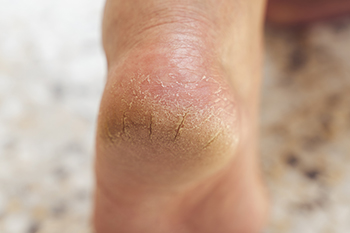
Cracked heels, also known as heel fissures, are a common foot condition characterized by dry, thickened skin with visible splits or cracks on the heels. These cracks can be superficial and painless, but in severe cases, they may deepen, bleed, or become painful, making walking and standing uncomfortable. Several factors contribute to the development of cracked heels, and some individuals are more susceptible than others. Dry skin, often due to inadequate moisturization or natural skin type, is a primary cause. The skin on the soles of the feet is naturally thicker and can become dehydrated, leading to cracking. Prolonged standing or walking, especially in ill-fitting shoes, can put excessive pressure on the feet and increase the risk. Additionally, underlying health conditions such as diabetes, thyroid disorders, and psoriasis can make an individual more prone to heel fissures. Effective prevention and treatment for cracked heels include regular moisturizing, wearing comfortable, well-fitting shoes, using foot supports, and addressing any underlying health concerns. If you have cracked heels, it is suggested that you make an appointment with a podiatrist who can prescribe effective medication for relief and recovery.
If the skin on your feet starts to crack, you may want to see a podiatrist to find treatment. If you have any concerns, contact Dr. Douglas Mckay from New Jersey . Our doctor can provide the care you need to keep you pain-free and on your feet.
Cracked Heels
It is important to moisturize your cracked heels in order to prevent pain, bleeding, and infection. The reason cracked heels form is because the skin on the foot is too dry to support the immense pressure placed on them. When the foot expands, the dry skin on the foot begins to split.
Ways to Help Heal Them
- Invest in a good foot cream
- Try Using Petroleum Jelly
- Ease up on Soaps
- Drink Plenty of Water
Ways to Prevent Cracked Heels
- Moisturize After Showering
- Skip a Shower
- Keep Shower Water Lukewarm
- Don’t Scrub Your Feet
If you are unsure how to proceed in treating cracked heels, seek guidance from a podiatrist. Your doctor will help you with any questions or information you may need.
If you have any questions, please feel free to contact one of our offices located in Caldwell, and Galloway, NJ . We offer the newest diagnostic and treatment technologies for all your foot care needs.
Foot Care Tips for Seniors
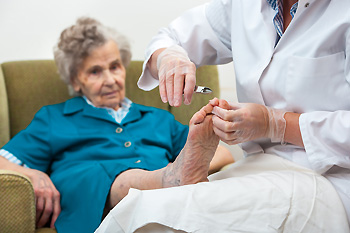
Properly caring for aging feet is crucial for maintaining a senior's health. Wearing properly fitted shoes, washing and moisturizing the feet daily, and conducting regular foot checks are all essential practices. Trimming the nails is also important, as well as seeking assistance from caregivers, family members, or other professionals for help if needed. Minimizing foot injuries is vital to prevent further issues. Participating in regular exercise will also keep the feet in good condition. Embracing nutritious diets promotes overall health. Resting the feet and avoiding high heels can further safeguard them. Special care is needed for seniors with diabetes to prevent complications. If you are a senior or you take care of one, it is suggested that you make an appointment with a podiatrist to obtain daily professional care.
If you need your feet checked, contact Dr. Douglas Mckay of New Jersey . Our doctor will attend to all of your foot and ankle needs and provide you with quality treatment.
Geriatrics and Podiatry
When people age, some common issues that may occur are bone density loss, dry skin, poor circulation, and rough brittle nails. These issues may also affect your foot health if the necessary steps are not taken to alleviate the problems.
It is important to take care of your feet because feet that are injured or diseased can affect your overall health. Having painful feet hinders your ability to do daily activities or may decrease your willingness to do the things that you need to do.
Visiting Your Geriatrician
As we age, health problems become more likely, so it is essential to visit your doctor for check-ups to ensure that you are doing the best you can to take care of your health. It is recommended to check your feet frequently for any possible cuts, bruises, swelling, corns or any other irregularities.
Taking Care of Elderly Feet
Cracked or dry feet can be treated by applying moisturizer often. It is also important not to wear old socks because the older the sock is, the higher the possibility there will be that there is bacteria there. Wear fresh socks and make sure they fit properly.
Proper foot health means that you can have a more active lifestyle and you will not be bogged down by pain. Foot health also leads to good circulation, which is paramount for overall health.
If you have any questions, please feel free to contact one of our offices located in Caldwell, and Galloway, NJ . We offer the newest diagnostic tools and technology to treat your foot and ankle needs.
Causes of Foot Stress Fractures
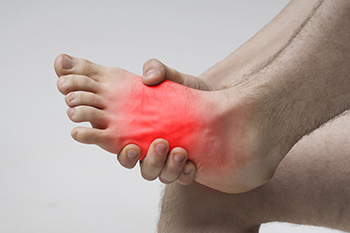
Stress fractures are tiny cracks in the bones that can result from excessive pounding or pressure and repeated trauma. One of the most common causes of stress fractures is engaging in high-impact activities. Sports like gymnastics, track and field and tennis, which involve constant pounding on hard surfaces, can put tremendous stress on the bones of your feet. Another significant cause is making sudden changes in the duration, frequency, or intensity of physical activity. Pushing your body too hard without adequate rest and recovery often leads to stress fractures. Wearing ill-fitting or worn-out running shoes without proper foot support can also contribute to stress fractures. Sometimes, anatomical abnormalities like flat feet or high rigid arches can increase your risk of developing stress fractures. Repetitive stress from exercises, especially in sports, can weaken bones over time, making them more susceptible to stress fractures. If you have had a stress fracture in the past, you may be at higher risk of experiencing another one. Women are more prone to stress fractures from osteoporosis, low bone density, irregular menstruation, and poor nutrition. Symptoms of stress fractures can be tricky to diagnose, as they may not show up on X-rays in the early stages. However, common symptoms can include a dull, generalized pain, swelling, and tenderness in a specific spot. This discomfort may worsen during activities and can persist even at rest if left untreated. If you suspect you may have a foot stress fracture, it is suggested that you make an appointment with a podiatrist for an exam and treatment options.
Stress fractures occur when there is a tiny crack within a bone. To learn more, contact Dr. Douglas Mckay from New Jersey . Our doctor can provide the care you need to keep you pain free and on your feet.
How Are They Caused?
Stress fractures are the result of repetitive force being placed on the bone. Since the lower leg and feet often carry most of the body’s weight, stress fractures are likely to occur in these areas. If you rush into a new exercise, you are more likely to develop a stress fracture since you are starting too much, too soon. Pain resulting from stress fractures may go unnoticed at first, however it may start to worsen over time.
Risk Factors
- Gender – They are more commonly found in women compared to men.
- Foot Problems – People with unusual arches in their feet are more likely to develop stress fractures.
- Certain Sports – Dancers, gymnasts, tennis players, runners, and basketball players are more likely to develop stress fractures.
- Lack of Nutrients – A lack of vitamin D and calcium may weaken the bones and make you more prone to stress fractures
- Weak Bones – Osteoporosis can weaken the bones therefore resulting in stress fractures
Stress fractures do not always heal properly, so it is important that you seek help from a podiatrist if you suspect you may have one. Ignoring your stress fracture may cause it to worsen, and you may develop chronic pain as well as additional fractures.
If you have any questions, please feel free to contact one of our offices located in Caldwell, and Galloway, NJ . We offer the newest diagnostic and treatment technologies for all your foot care needs.
Causes of Morning Heel Pain
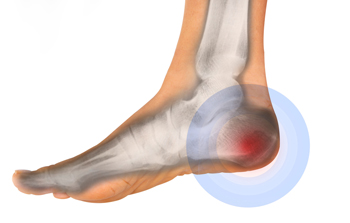
Morning heel pain can have several underlying causes. One of the most common culprits is plantar fasciitis, a condition in which the broad band of tissue that runs along the bottom of the foot becomes inflamed. This results in sharp or stabbing pain in the heel that tends to be most intense in the morning. Another source is Achilles tendonitis, which is the inflammation of the tendon that connects the calf muscles to the heel bone. It can be caused by tight calf muscles or overuse. Morning heel pain has also been linked to rheumatoid arthritis, an autoimmune condition that causes Inflammation in the foot joints and results in stiffness and discomfort, especially after periods of rest. A stress fracture in the heel bone may also be responsible for morning discomfort. These hairline fractures can cause localized pain that becomes more noticeable when you first put weight on your feet in the morning. Lastly, aging can contribute to morning heel pain, as the muscles, tendons, and ligaments lose some of their flexibility and resilience. If you're experiencing morning heel pain, it's suggested that you make an appointment with a podiatrist who can accurately diagnose the cause and recommend an appropriate treatment plan.
Many people suffer from bouts of heel pain. For more information, contact Dr. Douglas Mckay of New Jersey . Our doctor can provide the care you need to keep you pain-free and on your feet.
Causes of Heel Pain
Heel pain is often associated with plantar fasciitis. The plantar fascia is a band of tissues that extends along the bottom of the foot. A rip or tear in this ligament can cause inflammation of the tissue.
Achilles tendonitis is another cause of heel pain. Inflammation of the Achilles tendon will cause pain from fractures and muscle tearing. Lack of flexibility is also another symptom.
Heel spurs are another cause of pain. When the tissues of the plantar fascia undergo a great deal of stress, it can lead to ligament separation from the heel bone, causing heel spurs.
Why Might Heel Pain Occur?
- Wearing ill-fitting shoes
- Wearing non-supportive shoes
- Weight change
- Excessive running
Treatments
Heel pain should be treated as soon as possible for immediate results. Keeping your feet in a stress-free environment will help. If you suffer from Achilles tendonitis or plantar fasciitis, applying ice will reduce the swelling. Stretching before an exercise like running will help the muscles. Using all these tips will help make heel pain a condition of the past.
If you have any questions please contact one of our offices located in Caldwell, and Galloway, NJ . We offer the newest diagnostic and treatment technologies for all your foot and ankle needs.
How Overpronation Can Affect the Feet
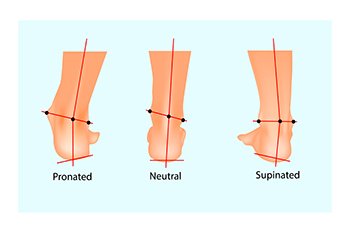
Overpronation is a common foot condition that can have a significant effect on your feet as well as your overall health. This malady occurs when the arches of the feet collapse excessively inward while walking or running. While some degree of pronation is normal, overpronation can lead to various issues. One of the most noticeable effects of overpronation is pain and discomfort. The excessive rolling of the foot can cause strain on the arches, leading to arch and heel pain. It can also contribute to problems in other body parts, such as shin splints, knee pain, and lower back pain as the misalignment in the feet affects the lower body's alignment. Over time, untreated overpronation can lead to more serious issues, including bunions, plantar fasciitis, and Achilles tendonitis. It also may be connected to development of hammertoes and Morton’s neuroma. Fortunately, podiatrists can provide solutions like custom orthotics and exercises to help alleviate the effects of overpronation and prevent further complications. If you suspect you may have overpronation issues, it is suggested that you make an appointment with a podiatrist for a gait evaluation and discussion on whether custom orthotics may be needed to keep your feet healthy and pain-free.
If you have any concerns about your feet, contact Dr. Douglas Mckay from New Jersey . Our doctor can provide the care you need to keep you pain-free and on your feet.
Biomechanics in Podiatry
Podiatric biomechanics is a particular sector of specialty podiatry with licensed practitioners who are trained to diagnose and treat conditions affecting the foot, ankle and lower leg. Biomechanics deals with the forces that act against the body, causing an interference with the biological structures. It focuses on the movement of the ankle, the foot and the forces that interact with them.
A History of Biomechanics
- Biomechanics dates back to the BC era in Egypt where evidence of professional foot care has been recorded.
- In 1974, biomechanics gained a higher profile from the studies of Merton Root, who claimed that by changing or controlling the forces between the ankle and the foot, corrections or conditions could be implemented to gain strength and coordination in the area.
Modern technological improvements are based on past theories and therapeutic processes that provide a better understanding of podiatric concepts for biomechanics. Computers can provide accurate information about the forces and patterns of the feet and lower legs.
Understanding biomechanics of the feet can help improve and eliminate pain, stopping further stress to the foot.
If you have any questions please feel free to contact one of our offices located in Caldwell, and Galloway, NJ . We offer the newest diagnostic and treatment technologies for all your foot and ankle needs.
Wounds That Don't Heal Need to Be Checked
Orthotics May Help to Treat Corns and Calluses
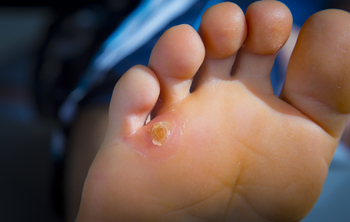
Foot corns and calluses are common conditions resulting from continuous friction and pressure. Calluses typically develop beneath the ball of the foot, around the heel area, and under the big toe. Corns are a specific type of callus characterized by a hard central core found on top of and between the toes. Various factors contribute to the formation of calluses and corns. Wearing ill-fitting shoes that are tight, narrow, or high-heeled, are frequent culprits. Underlying foot issues such as bunions, hammer toes, or arthritis can also lead to an excess buildup of calluses and corns. However, the most common cause is excessive pressure and friction due to overpronation. An effective treatment for calluses and corns can involve professional removal by a podiatrist. Custom-made orthotics offer a preventive approach by biomechanically realigning the foot, reducing excess pressure, and minimizing friction. If you suffer from calluses and corns on your feet, it is suggested that you make an appointment with a podiatrist to discuss if orthotics are the correct solution.
If you have any concerns regarding your feet and ankles, contact Dr. Douglas Mckay of New Jersey . Our doctor will treat your foot and ankle needs.
Corns: What Are They? and How Do You Get Rid of Them?
Corns can be described as areas of the skin that have thickened to the point of becoming painful or irritating. They are often layers and layers of the skin that have become dry and rough, and are normally smaller than calluses.
Ways to Prevent Corns
There are many ways to get rid of painful corns such as wearing:
- Well-fitting socks
- Comfortable shoes that are not tight around your foot
- Shoes that offer support
Treating Corns
Treatment of corns involves removing the dead skin that has built up in the specific area of the foot. Consult with Our doctor to determine the best treatment option for your case of corns.
If you have any questions please feel free to contact one of our offices located in Caldwell, and Galloway, NJ . We offer the newest diagnostic and treatment technologies for all your foot and ankle needs.
More...
Understanding the Causes of Tarsal Tunnel Syndrome
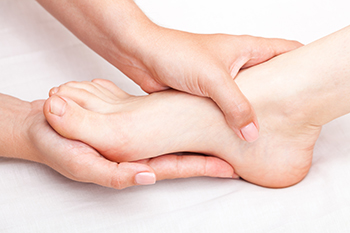
Tarsal tunnel syndrome, abbreviated TTS, is a relatively lesser-known but impactful condition affecting the feet. It is comparable to the more recognized carpal tunnel syndrome but occurs in the ankle. TTS is characterized by compression or irritation of the tibial nerve as it passes through the tarsal tunnel, a narrow space on the inside of the ankle, behind the medial malleolus. Various factors can contribute to TTS, with the most common cause being excessive pressure on the nerve due to inflammation or injury. Additional potential causes include overpronation, diabetes, and systemic diseases such as arthritis. Symptoms often include tingling, burning sensations, and pain along the inner ankle and sole that can radiate into the toes. Treatment options for tarsal tunnel syndrome depend on its severity. Conservative approaches include getting adequate rest, taking anti-inflammatory medications, or wearing orthotic devices. These treatments can help to alleviate pressure on the nerve. In severe cases, surgical intervention may be necessary to decompress the tibial nerve. Early diagnosis and appropriate management are essential to relieving the discomfort associated with tarsal tunnel syndrome and restoring normal foot function. If you have this condition, it is strongly suggested that you are under the care of a podiatrist who can effectively manage tarsal tunnel syndrome.
Tarsal tunnel syndrome can be very uncomfortable to live with. If you are experiencing tarsal tunnel syndrome, contact Dr. Douglas Mckay of New Jersey . Our doctor can provide the care you need to keep you pain-free and on your feet.
Tarsal Tunnel Syndrome
Tarsal tunnel syndrome, which can also be called tibial nerve dysfunction, is an uncommon condition of misfiring peripheral nerves in the foot. The tibial nerve is the peripheral nerve in the leg responsible for sensation and movement of the foot and calf muscles. In tarsal tunnel syndrome, the tibial nerve is damaged, causing problems with movement and feeling in the foot of the affected leg.
Common Cause of Tarsal Tunnel Syndrome
- Involves pressure or an injury, direct pressure on the tibial nerve for an extended period of time, sometimes caused by other body structures close by or near the knee.
- Diseases that damage nerves, including diabetes, may cause tarsal tunnel syndrome.
- At times, tarsal tunnel syndrome can appear without an obvious cause in some cases.
The Effects of Tarsal Tunnel Syndrome
- Different sensations, an afflicted person may experience pain, tingling, burning or other unusual sensations in the foot of the affected leg.
- The foot muscles, toes and ankle become weaker, and curling your toes or flexing your foot can become difficult.
- If condition worsens, infections and ulcers may develop on the foot that is experiencing the syndrome.
A physical exam of the leg can help identify the presence of tarsal tunnel syndrome. Medical tests, such as a nerve biopsy, are also used to diagnose the condition. Patients may receive physical therapy and prescriptive medication. In extreme cases, some may require surgery.
If you have any questions please feel free to contact one of our offices located in Caldwell, and Galloway, NJ . We offer the newest diagnostic and treatment technologies for all your foot and ankle needs.
Pressure Ulcers on the Feet
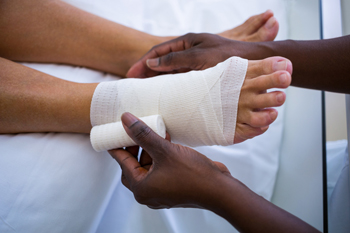
Pressure ulcers are a significant concern in healthcare. These wounds develop due to prolonged pressure on the skin, often affecting individuals with limited mobility or those with underlying health conditions. Pressure ulcers can also result from reduced blood flow to the skin. Any break in the skin caused by pressure can lead to infection. Common infections related to pressure ulcers include localized infections, cellulitis, and osteomyelitis, which can progress to sepsis, a life-threatening condition. Prolonged pressure reduces blood flow to the skin, which can result in tissue damage. Foot pressure ulcers often occur on bony prominences such as the heels and ankles. People using improperly fitted prosthetics, those who wear shoes that rub on various parts of the foot, and people with fragile skin are more susceptible to these wounds. Early detection and treatment are essential for better outcomes. Daily foot checks can help detect pressure ulcers and result in timely intervention. If the skin breaks, vigilance should be practiced for signs of infection, such as pus, foul odor, and increased redness. Once a pressure ulcer forms, treatment includes wound cleaning, protection from pressure, and other medical care depending on the severity of the ulcer. If you have a foot wound, it is strongly suggested that you make an appointment with a podiatrist as quickly as possible for treatment.
Wound care is an important part in dealing with diabetes. If you have diabetes and a foot wound or would like more information about wound care for diabetics, consult with Dr. Douglas Mckay from New Jersey . Our doctor will assess your condition and provide you with quality foot and ankle treatment.
What Is Wound Care?
Wound care is the practice of taking proper care of a wound. This can range from the smallest to the largest of wounds. While everyone can benefit from proper wound care, it is much more important for diabetics. Diabetics often suffer from poor blood circulation which causes wounds to heal much slower than they would in a non-diabetic.
What Is the Importance of Wound Care?
While it may not seem apparent with small ulcers on the foot, for diabetics, any size ulcer can become infected. Diabetics often also suffer from neuropathy, or nerve loss. This means they might not even feel when they have an ulcer on their foot. If the wound becomes severely infected, amputation may be necessary. Therefore, it is of the upmost importance to properly care for any and all foot wounds.
How to Care for Wounds
The best way to care for foot wounds is to prevent them. For diabetics, this means daily inspections of the feet for any signs of abnormalities or ulcers. It is also recommended to see a podiatrist several times a year for a foot inspection. If you do have an ulcer, run the wound under water to clear dirt from the wound; then apply antibiotic ointment to the wound and cover with a bandage. Bandages should be changed daily and keeping pressure off the wound is smart. It is advised to see a podiatrist, who can keep an eye on it.
If you have any questions, please feel free to contact one of our offices located in Caldwell, and Galloway, NJ . We offer the newest diagnostic and treatment technologies for all your foot care needs.
Tendonitis Across the Top of the Foot

Extensor tendonitis is a common foot issue that causes discomfort across the top of the foot. This condition stems from irritation or inflammation of tendons that are critical for lifting the toes. Repetitive friction and pressure, often due to ill-fitting shoes, are common causes of extensor tendonitis. The primary tendons involved are the extensor hallucis longus, which lifts the big toe, and the extensor digitorum, for the other toes. Extending from lower leg muscles, these tendons cross the front of the ankle, span the upper foot, and attach to toe tips. Their limited protection renders them susceptible to injuries and leads to pain. Overuse or excessive pressure causes inflammation and swelling in these tendons. In time, this can weaken them and cause scarring that reduces flexibility and strength. Risk factors include tight shoes, prolonged weight-bearing, and calf muscle tightness. Pain from extensor tendonitis usually worsens with activity but subsides during rest. Common signs are swelling, tenderness, and bruising. If you are experiencing symptoms of extensor tendonitis, it is suggested that you make an appointment with a podiatrist for a diagnosis and the appropriate treatment options.
Foot Pain
Foot pain can be extremely painful and debilitating. If you have a foot pain, consult with Dr. Douglas Mckay from New Jersey . Our doctor will assess your condition and provide you with quality foot and ankle treatment.
Causes
Foot pain is a very broad condition that could be caused by one or more ailments. The most common include:
- Bunions
- Hammertoes
- Plantar Fasciitis
- Bone Spurs
- Corns
- Tarsal Tunnel Syndrome
- Ingrown Toenails
- Arthritis (such as Gout, Rheumatoid, and Osteoarthritis)
- Flat Feet
- Injury (from stress fractures, broken toe, foot, ankle, Achilles tendon ruptures, and sprains)
- And more
Diagnosis
To figure out the cause of foot pain, podiatrists utilize several different methods. This can range from simple visual inspections and sensation tests to X-rays and MRI scans. Prior medical history, family medical history, and any recent physical traumatic events will all be taken into consideration for a proper diagnosis.
Treatment
Treatment depends upon the cause of the foot pain. Whether it is resting, staying off the foot, or having surgery; podiatrists have a number of treatment options available for foot pain.
If you have any questions, please feel free to contact one of our offices located in Caldwell, and Galloway, NJ . We offer the newest diagnostic and treatment technologies for all your foot care needs.




